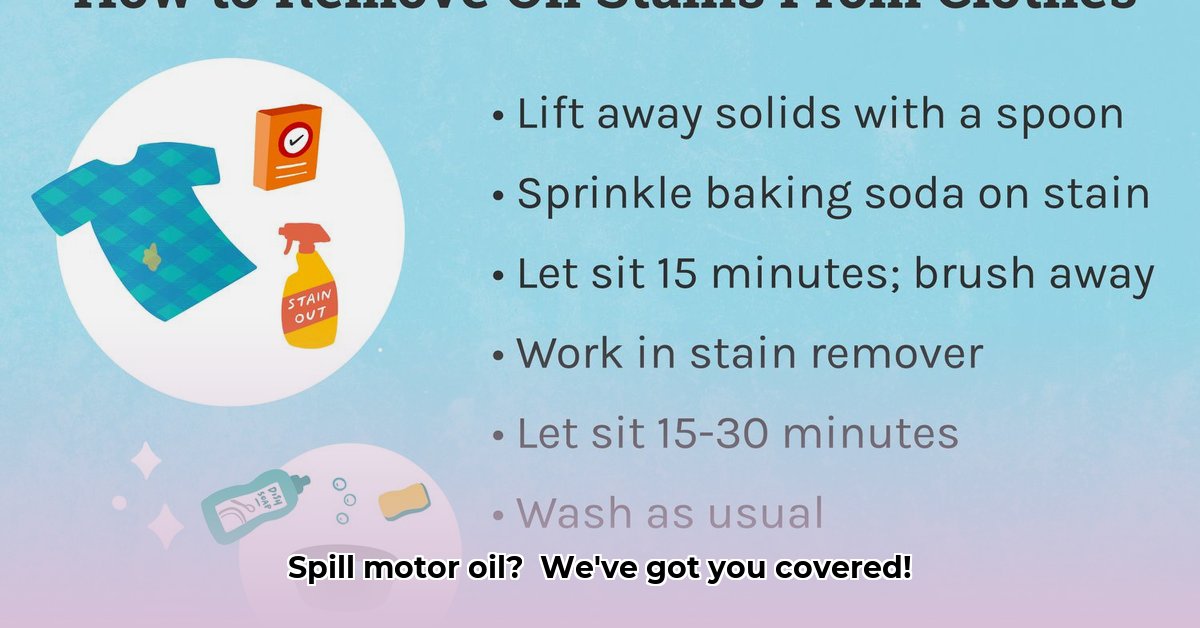Decoding the Stain: Motor Oil and Fabric Dynamics
Motor oil stains are a common laundry challenge, but not an insurmountable one. Whether you’re a seasoned mechanic or simply encountered a leaky oil container, understanding the nature of the stain and your fabric type is the first step to effective removal. This guide provides practical, step-by-step instructions and expert tips to restore your clothes to their pristine condition. For more in-depth information, check out this helpful guide.
The Importance of Immediate Action
- Time is Critical: Fresh motor oil stains are considerably easier to tackle than set-in ones. Address the stain immediately upon discovery to maximize your chances of complete removal. Every minute counts!
- Blot, Don’t Rub: Rubbing a motor oil stain will only exacerbate the problem by spreading the oil and driving it deeper into the fabric fibers. Instead, gently blot the affected area with a clean cloth or paper towel to absorb excess oil. The blotting technique itself can significantly influence your success.
- Harnessing the Power of Absorbents: Common household items like cornstarch, baking soda, and baby powder can be remarkably effective at absorbing fresh oil. Generously cover the stain with your chosen absorbent and allow it to sit undisturbed for at least 30 minutes, or even longer for heavily saturated stains. The darkening of the powder indicates it’s actively absorbing the oil, a visual cue of its effectiveness.
Targeted Stain Removal Strategies
Fresh Stains (Less than 24 Hours Old)
- The Dish Soap Powerhouse: Dish soap, formulated to cut through grease, is a potent weapon against fresh motor oil stains. Apply a small amount of grease-fighting dish soap directly to the stain, gently massaging it into the fabric with your fingertips or a soft-bristled brush. Allow the dish soap to penetrate the stain for 15-20 minutes before laundering the garment as usual. The effectiveness of this method lies in the dish soap’s inherent grease-cutting properties. For enhanced cleaning power, pre-treat the stain with dish soap before applying laundry detergent.
- Pre-Treatment with Laundry Detergent: Boost your laundry detergent’s cleaning prowess by using it as a pre-treatment. Apply a generous amount of liquid laundry detergent directly to the stain, ensuring thorough saturation. Let the detergent work its magic for at least 30 minutes, and up to an hour for stubborn stains, before washing the garment. This pre-treatment step can make a noticeable difference in stain removal effectiveness.
Set-In Stains (24 Hours or Older)
- The Baking Soda Paste Tactic: Baking soda’s gentle abrasive action makes it an excellent choice for tackling older, set-in stains. Create a thick paste by mixing baking soda with a small amount of water. Apply this paste generously to the stain, ensuring complete coverage. Allow the paste to dry completely, which may take several hours or even overnight. Once dry, gently brush off the dried paste and launder the garment according to its care instructions. The baking soda helps lift the oil from the fabric fibers without harsh scrubbing.
- Commercial Stain Removers: A Targeted Approach: Numerous commercial stain removers are specifically designed to tackle grease and oil stains. When selecting a commercial stain remover, choose one formulated for your specific fabric type. Always adhere to the manufacturer’s instructions and test the product on an inconspicuous area of the garment first to ensure colorfastness. Some commercial stain removers may contain harsh chemicals; therefore, appropriate precautions should be taken.
Fabric-Specific Care: Tailoring Your Approach
Delicates (Silk, Wool, Cashmere)
Delicate fabrics require a gentler touch. Opt for a mild detergent designed for delicates, or even baby shampoo, and avoid vigorous scrubbing, which can damage the fibers. If uncertain about the best course of action, professional dry cleaning is the safest route for preserving the integrity of your delicate garments. Test any cleaning method on an inconspicuous area before applying it to the visible stain.
Durable Fabrics (Cotton, Denim)
Durable fabrics like cotton and denim can generally tolerate more robust cleaning methods. However, always consult the garment’s care label before proceeding. Even durable fabrics have temperature limitations, and some may require specific cleaning instructions. Hot water can be effective for removing oil from durable fabrics, but ensure the fabric can withstand high temperatures.
Troubleshooting and Preventive Measures
Persistent Stains: Don’t Give Up!
If the stain proves resistant to your initial efforts, don’t despair. Repeat the chosen method or experiment with combining methods. Pre-treating with dish soap followed by a baking soda paste application, for example, can be a powerful combination. For exceptionally stubborn stains that defy all attempts at home removal, professional dry cleaning may be the ultimate solution.
Preventing Future Stains: Proactive Strategies
Preventing stains is always preferable to dealing with their aftermath. When working with motor oil or engaging in activities that pose a risk of oil spills, wear protective clothing such as coveralls or an apron. Cover your work area with drop cloths or newspapers to create a barrier against spills. Exercise caution when handling oily tools and equipment, and clean up any spills promptly to minimize the risk of staining. Having a designated set of “work clothes” can also alleviate the stress of potential stains. Storing oily rags and materials properly can prevent accidental stains and maintain a safe work environment.
Quick Reference Guide
| Stain Age | Fabric Type | Recommended Method(s) |
|---|---|---|
| Fresh (<24 hrs) | Durable | Dish soap, Laundry Detergent Pre-Treatment, Absorbent Powders |
| Fresh (<24 hrs) | Delicate | Gentle detergent, Baby Shampoo, Absorbent Powders, Professional Dry Cleaning (if unsure) |
| Old (>24 hrs) | Durable | Baking Soda Paste, Commercial Stain Remover, Dish Soap Pre-Treatment |
| Old (>24 hrs) | Delicate | Professional Dry Cleaning |
- Why Do My Installation Keep Stopping on Xbox? - February 16, 2026
- How to Fix Installation Stopped Xbox One Digital Download - February 15, 2026
- Resolve Game Not Installing on Xbox One Installation Problems - February 14, 2026
